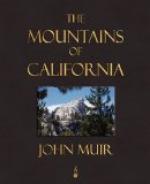Setting out from Pasadena, I reached the foot of the range about sundown; and being weary and heated with my walk across the shadeless valley, concluded to camp for the night. After resting a few moments, I began to look about among the flood-boulders of Eaton Creek for a camp-ground, when I came upon a strange, dark-looking man who had been chopping cord-wood. He seemed surprised at seeing me, so I sat down with him on the live-oak log he had been cutting, and made haste to give a reason for my appearance in his solitude, explaining that I was anxious to find out something about the mountains, and meant to make my way up Eaton Creek next morning. Then he kindly invited me to camp with him, and led me to his little cabin, situated at the foot of the mountains, where a small spring oozes out of a bank overgrown with wild-rose bushes. After supper, when the daylight was gone, he explained that he was out of candles; so we sat in the dark, while he gave me a sketch of his life in a mixture of Spanish and English. He was born in Mexico, his father Irish, his mother Spanish. He had been a miner, rancher, prospector, hunter, etc., rambling always, and wearing his life away in mere waste; but now he was going to settle down. His past life, he said, was of “no account,” but the future was promising. He was going to “make money and marry a Spanish woman.” People mine here for water as for gold. He had been running a tunnel into a spur of the mountain back of his cabin. “My prospect is good,” he said, “and if I chance to strike a good, strong flow, I’ll soon be worth $5000 or $10,000. For that flat out there,” referring to a small, irregular patch of bouldery detritus, two or three acres in size, that had been deposited by Eaton Creek during some flood season,—“that flat is large enough for a nice orange-grove, and the bank behind the cabin will do for a vineyard, and after




